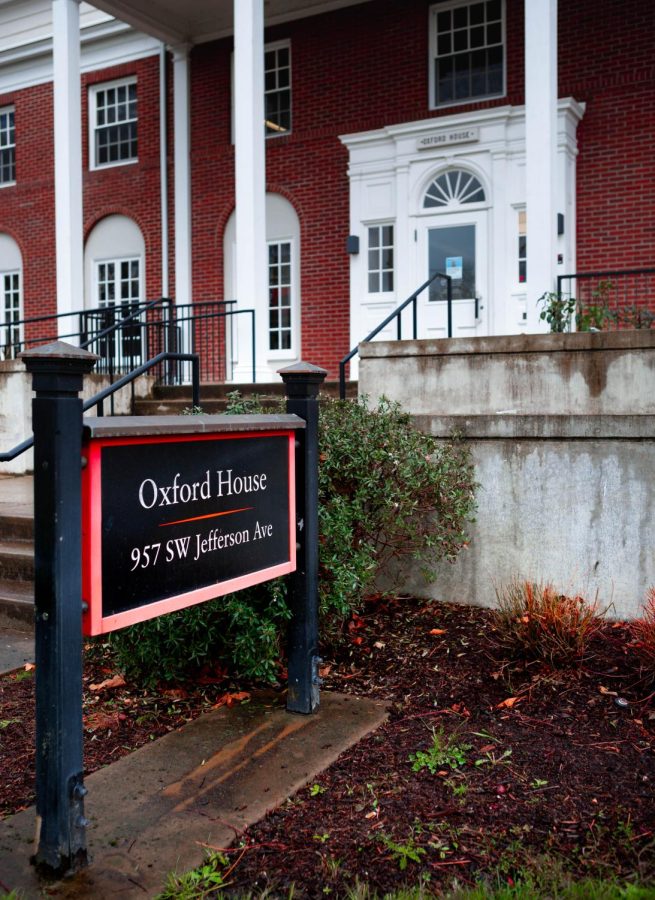Find help with housing both on campus and off
Oxford House, 957 SW Jefferson Ave., is where one can find Oregon State’s University Housing and Dining Services offices. A reception desk is right inside, where someone is there to help students get information about housing options available through OSU.
March 9, 2022
WITH THE AVERAGE cost of rent in Corvallis, Ore. being $1,473 per month for an average-sized apartment of 824 square feet, there are resources available for students of Oregon State University facing housing insecurity.
In extreme cases, the Human Services Resource Center is able to provide emergency housing for up to 28 days for up to 10 people at a time. Outside of this program, the HSRC provides other ways for students to save money, which they can then use for housing.
For example, they provide Healthy Beaver Bags, which are ingredients and recipe kits available on Fridays from noon to 2:30 p.m. and can be picked up with a valid OSU student ID at the back porch of Champinefu Lodge. Additionally, open from 10 a.m. to 3 p.m. on Wednesdays, the HSRC food pantry is also available and only requires participants to give their name and zip code in order to qualify.
“They can choose from any [selection], and this changes weekly,” said Food Security Assistant Tina Hanby. “You’ve got a nice variety of items that you can have… If you can’t make it on Wednesdays, you can always come on Mondays or Thursdays and make an appointment and we’ll have everything ready for you.”
Other HSRC programs designed to help students facing financial issues include the HSRC Food Assistance Application and guidance for those applying for the Supplemental Nutrition Assistance Program available through the federal government, as well as the textbook lending program shared with the Valley Library.
“I think the textbook program is a good example of how [the library] works really well with the HSRC,” said Steve Weber, coordinator for circulation services at the Valley Library. “They use the same system we do in the library to keep track of all the books that they have.”
For housing cases the HSRC is not able to take care of, students are sent to other organizations, such as Jackson Street Youth Services. Jackson Street helps people from ages 10-24, and for college age participants, the organization groups them in their Next Steps Program.
“We offer housing and support,” said Executive Director of Jackson Street Ann Craig. “If you’re 18 to 20, experiencing homelessness and you need some extra support, you can be in our program where you can stay up to 18 months.”
According to Craig, while the Next Steps Program does not require them to pay rent, program participants who are making an income have to set aside 30% of their earnings for savings. This is to help them have at least a couple months of rent ready for when they leave the program.
“For those students that are 21 through 24, they can still access that program,” Craig said. “Even if they’re younger, they can decide that they don’t need all that support—they don’t need the skill building or the support getting a job or with school. In that case, we can support them with basically discounted rent.”
According to Craig, many students may not even think of themselves as houseless because of the negative stigma associated with the word, which can stop them from asking for help when they need it. Craig said using the label ‘homeless’ is not always necessary; oftentimes, it is just important to recognize when someone needs a safe place to live and be self-sufficient.
Craig said the people who visit Jackson Street are very diverse, but that the organization sees a lot of people with similar upbringings.
“We see many young people who have experienced trauma in their childhood,” Craig said. “Maybe they’ve had parents die or they’ve been neglected or abused in the past, and they may have a distrust of adults or getting help.”
According to Craig, LGBTQ+ youth are another common demographic of people Jackson Street sees a lot of; people who need housing because their identities were not accepted by their families.
“That’s why they don’t have this kind of support that you would normally have when you’re transitioning to adulthood,” Craig said. “They need some extra help navigating, that maybe their parents aren’t willing to do for them.”
According to Craig, there are other options for those facing housing insecurity, such as Community Outreach, Inc. The organization has a transitional housing program as well as programs to help people dealing with drug abuse or addiction. COI did not respond for comment in time for publication.
There are also many opportunities to assist Jackson Street through donations and volunteering.
“We are always looking for academic coaches, for leaders for youth activities, for mentors,” said Craig. “Mentors are a bigger commitment, because we’re looking for someone who will be willing to work with that youth for a whole year.”












































































































